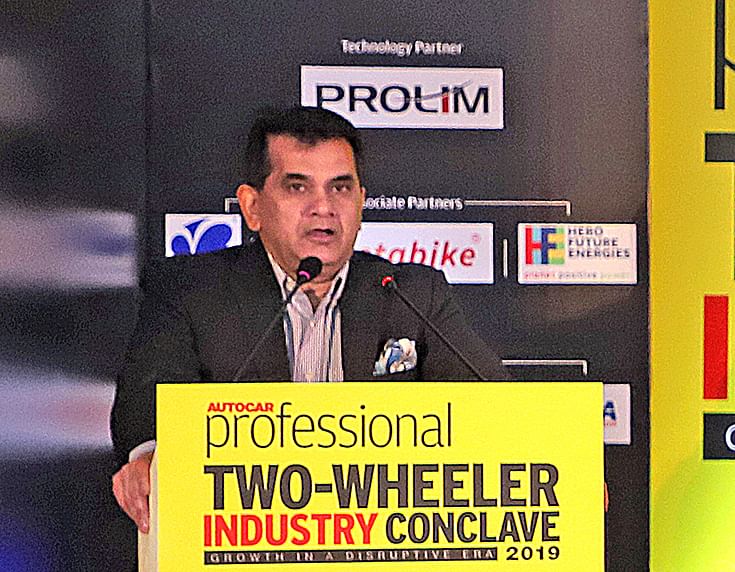NITI Aayog charts out four paths to build clean, sustainable mobility in India
Nearly 97 percent of total electric vehicle volumes in India comprise of two-wheelers. NITI Aayog says India must leverage its market strength to take a lead globally.
In India, there’s a mixed performance by the auto sector when it comes to electric mobility. While electric two-wheelers and three-wheelers have found a fair level of traction, other vehicle segments are far behind. The Indian electric vehicle (EV) market saw a 20 percent growth in 2019-20 with sales of 156,000 units, of which 152,000 or 97 percent of total volume were two-wheelers.
The industry size doesn’t include sales in largely unorganised three-wheeler market, which is estimated to be at around 90,000 during the last financial year. NITI Aayog, the government's policy think tank, is of the view that India must leverage its market strengths to “leapfrog” in the emerging global EV industry. “2, 3-wheelers constitute 80 percent of India’s domestic automobile sales. We must leverage this,” says Amitabh Kant, CEO, NITI Aayog.

Addressing the inaugural session of the first batch of MS (by Research) in e-mobility programme at IIT Guwahati on Saturday, the senior bureaucrat listed down three more ways India should take to be a leader in clean, connected and shared mobility. Here’s what he said, “India’s per capita car ownership is just 20 vehicles per 1000 people. In USA, it’s 900 per 1,000. In Europe, it’s 800 per 1,000. And therefore, when we move from 20 to 900 or 800, there’s an opportunity to leapfrog ahead of the legacy model. The combustion vehicle model is a legacy model, and how do we use technology to leapfrog. This low per capita car ownership provides us an opportunity to leapfrog, and our emphasis must be on shared, connected and electric transportation.
“We need to push for public transportation to become the preferred mode of travel. I’m a great believer that the future will lie in public mode of transportation. And, inter-city, and inter-state movement also has to be electrified.
Only 63 of the 458 cities in India have a formal city bus system. And 15 cities have bus or rail based mass rapid transport system. So, public transport must become the core focus area for urban areas, municipalities and state cities.”
“As we shift from ICE vehicles to EVs we must create an ecosystem to encourage and ensure make in India for EV parts. If we have to reduce the cost, we have to make in India. That is where IIT engineers must play a key role. New battery technologies is what you should focus on. Because Lithium, Cobalt and Nickel are not available in India can we look at Solid State Lithium-ion batteries (using materials from recycled batteries), Sodium-ion batteries, and Silicon based batteries. These are all under development. Can we make a breakthrough in this? We need to vigorously pursue research and development in these areas and have a clear roadmap for manufacturing in India.”
EV tech development at IIT Guwahati
Engineers at IIT Guwahati’s EEE department have already researched and developed synchronous reluctance motors, in alliance with Non-ferrous Materials Technology Development Centre, that do not use rare earth materials, and thereby avoid importing raw materials. Currently, they are working on suitable controllers for these EV motors.
Over the last 4 years or so, IIT Guwahati has developed multiple EV solutions like motors, chargers. It has also designed a three-wheeled electric scooter. In the area of motors, IIT Guwahati is looking to deliver options ranging from 1kW (for two-wheelers) to 120kW (city buses). The engineering institute has a plan to eventually design an entire EV powertrain. However, it also realises the importance of collaboration with the industry in order to develop the right solutions and scale them up the right way too. The MS programme for e-mobility, the first of its kind in India, can also be joined by engineers employed in the industry. The programme, offered jointly by IIT Guwahati’s electronics and electrical engineering (EEE), and mechanical engineering departments, also has a provision of senior experienced industry professionals to conduct sessions. “This is a very pathbreaking initiative. It is pathbreaking because India is in the midst of a major technological disruption,” says Kant. And technology development will happen better in India when there’s better industry-academia collaboration. “We have decided that starting this year every department should have industry advisors. Three members in every department will be experienced professionals who are successful in research and development in the industry so that our curriculums get modified over a period of time,” says Professor Dr. T G Sitharam, who took over as director, IIT Guwahati in July 2019. Dr. Sitharam also said that the e-mobility MS programme can offer as many as 100 seats for engineers from the EV industry to join. With such developments, both industry and academia in India stand to mutually benefit and push the technology envelope well in the “sunrise” industry of electric mobility. “We are facing huge shortage of good engineers in this area. This is a sunrise area, and can emerge as the biggest catalyst of a clean environment, lower trade deficit, and it can create new jobs for India,” says Kant while signing off his address.
RELATED ARTICLES
Cosmo First diversifies into paint protection film and ceramic coatings
The Aurangabad, Maharashtra-based packaging materials supplier is leveraging its competencies in plastic films and speci...
JSW MG Motor India confident of selling 1,000 M9 electric MPVs in first year
The 5.2-metre-long, seven-seater luxury electric MPV, which will be locally assembled at the Halol plant in Gujarat, wil...
Modern Automotives targets 25% CAGR in forged components by FY2031, diversifies into e-3Ws
The Tier-1 component supplier of forged components such as connecting rods, crankshafts, tie-rods, and fork bridges to l...






 22 Sep 2020
22 Sep 2020
 10791 Views
10791 Views








 Autocar Professional Bureau
Autocar Professional Bureau




